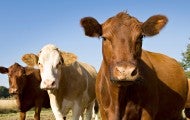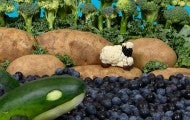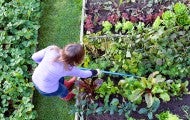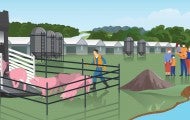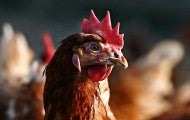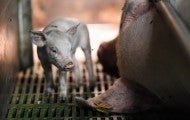My husband and I were contemplating whether to hike the 3-mile trail in Utah’s Zion National Park that September day. I’d read that this trail was our best chance to spot bighorn sheep, but after a week of exploring the five national parks in the state, our bodies were tired—and it was already late...
For wildlife on a beautiful 32-acre property in Mount Airy, Maryland, life is sweeter—and safer—because of the pledge landowners Jennifer Bevan-Dangel and Andrew Dangel made to follow the Humane Stewardship Alliance’s humane stewardship principles in managing their land. Lands of all sizes can be...
There’s a surprisingly simple way to make a big difference in the lives of animals: incorporating more plant-based foods. The more plants you eat, the more animals you’ll spare from lives of suffering. Fewer mother pigs will be kept in crates so small they can barely move. Fewer egg-laying hens will...
The term “roadkill” was coined in the 1940s, according to Merriam-Webster, entering the lexicon alongside “DDT” and other harbingers of a dystopian technological age that runs roughshod over the natural world. In the 1990s, the word became a cheeky insult when a rival called then-House Speaker Newt...
Rochester Institute of Technology has committed to having 50% plant-based offerings on menus by 2025, in collaboration with the Humane Society of the United States. As part of this effort, HSUS chefs provided an in-person plant-based culinary training to the university culinary staff. These events...
Imagine a chicken. Picture her downy white feathers and small, intense eyes. Maybe she’s sitting on a nest, softly clucking. Perhaps she’s scratching in the dirt, a quaint red barn in silhouette behind her. Cows graze contentedly nearby; a pig snuffles in the mud. It’s an idyllic vision, familiar...
The Humane Society of the United States has released its annual Protein Sustainability Scorecard, which assesses the efforts of top U.S. food service companies to reduce their impact on the environment and animals through purchasing and menuing practices. The companies included in this report are...
Around the world, animals used for meat, eggs and dairy often suffer on factory farms where they are treated as units of production rather than living, feeling creatures. The Humane Society of the United States and Humane Society International present comprehensive reports on animal agribusiness and...
LPM Holding Company Inc and Affiliates, a family-owned business serving predominantly business and industry food service operations, has launched a re-designed, innovative plant-based concept companywide in collaboration with the Humane Society of the United States, committing that 40% of its menu...

